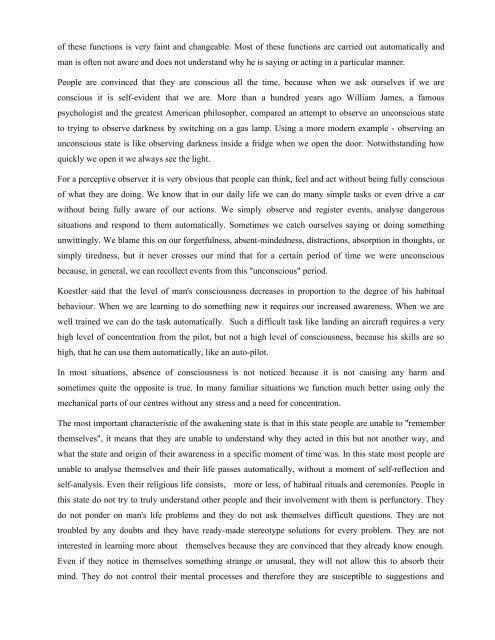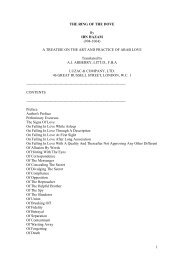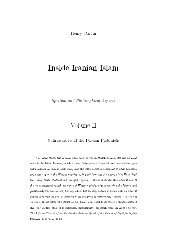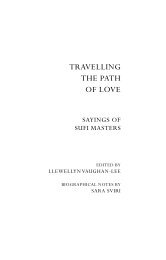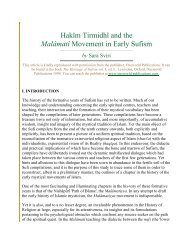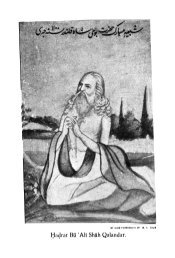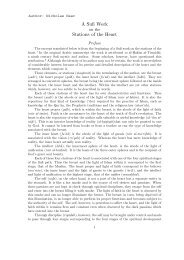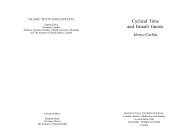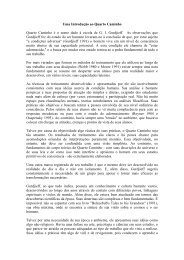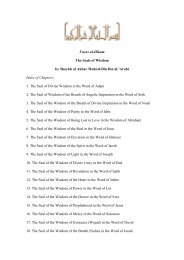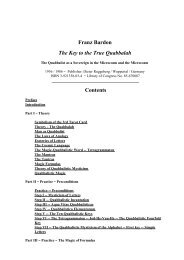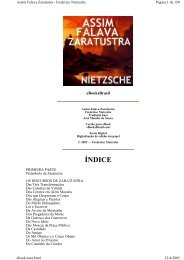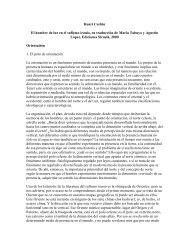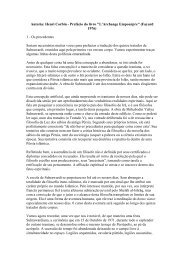Gurdjieff - ImagoMundi
Gurdjieff - ImagoMundi
Gurdjieff - ImagoMundi
You also want an ePaper? Increase the reach of your titles
YUMPU automatically turns print PDFs into web optimized ePapers that Google loves.
of these functions is very faint and changeable. Most of these functions are carried out automatically and<br />
man is often not aware and does not understand why he is saying or acting in a particular manner.<br />
People are convinced that they are conscious all the time, because when we ask ourselves if we are<br />
conscious it is self-evident that we are. More than a hundred years ago William James, a famous<br />
psychologist and the greatest American philosopher, compared an attempt to observe an unconscious state<br />
to trying to observe darkness by switching on a gas lamp. Using a more modern example - observing an<br />
unconscious state is like observing darkness inside a fridge when we open the door. Notwithstanding how<br />
quickly we open it we always see the light.<br />
For a perceptive observer it is very obvious that people can think, feel and act without being fully conscious<br />
of what they are doing. We know that in our daily life we can do many simple tasks or even drive a car<br />
without being fully aware of our actions. We simply observe and register events, analyse dangerous<br />
situations and respond to them automatically. Sometimes we catch ourselves saying or doing something<br />
unwittingly. We blame this on our forgetfulness, absent-mindedness, distractions, absorption in thoughts, or<br />
simply tiredness, but it never crosses our mind that for a certain period of time we were unconscious<br />
because, in general, we can recollect events from this "unconscious" period.<br />
Koestler said that the level of man's consciousness decreases in proportion to the degree of his habitual<br />
behaviour. When we are learning to do something new it requires our increased awareness. When we are<br />
well trained we can do the task automatically. Such a difficult task like landing an aircraft requires a very<br />
high level of concentration from the pilot, but not a high level of consciousness, because his skills are so<br />
high, that he can use them automatically, like an auto-pilot.<br />
In most situations, absence of consciousness is not noticed because it is not causing any harm and<br />
sometimes quite the opposite is true. In many familiar situations we function much better using only the<br />
mechanical parts of our centres without any stress and a need for concentration.<br />
The most important characteristic of the awakening state is that in this state people are unable to "remember<br />
themselves", it means that they are unable to understand why they acted in this but not another way, and<br />
what the state and origin of their awareness in a specific moment of time was. In this state most people are<br />
unable to analyse themselves and their life passes automatically, without a moment of self-reflection and<br />
self-analysis. Even their religious life consists, more or less, of habitual rituals and ceremonies. People in<br />
this state do not try to truly understand other people and their involvement with them is perfunctory. They<br />
do not ponder on man's life problems and they do not ask themselves difficult questions. They are not<br />
troubled by any doubts and they have ready-made stereotype solutions for every problem. They are not<br />
interested in learning more about themselves because they are convinced that they already know enough.<br />
Even if they notice in themselves something strange or unusual, they will not allow this to absorb their<br />
mind. They do not control their mental processes and therefore they are susceptible to suggestions and


